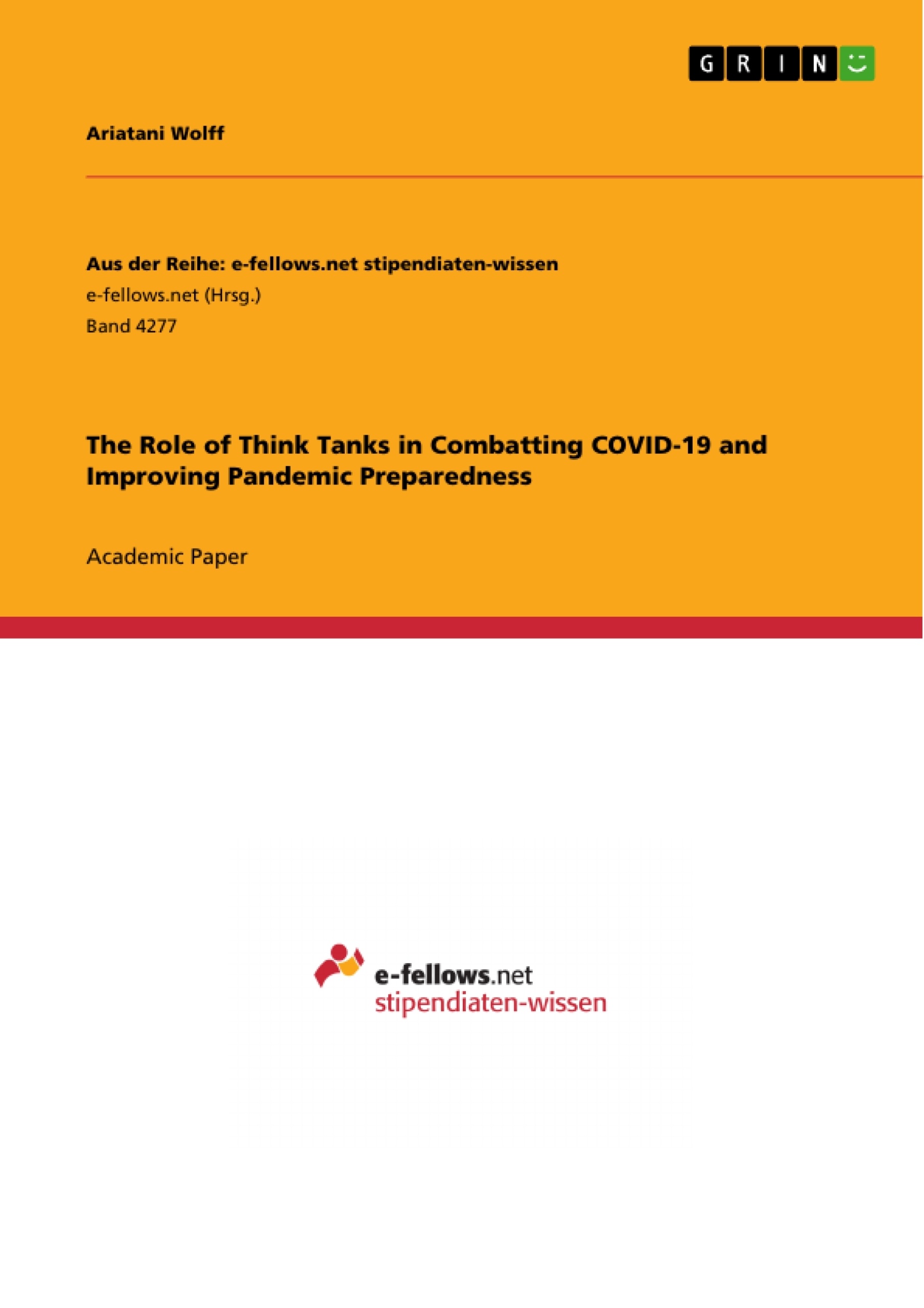When the COVID-19 pandemic started, Think Tanks were just as many other institutions forced to adapt to the new circumstances. Whereas some were not able to continue with there work, most of them managed to continue with their research and used their resources to support the global fight against the pandemic. To show in which way they have influenced the handling of the pandemic and which policy recommendations they did provide to improve pandemic preparedness is the key purpose of this paper.
Like never before, think tanks had to measure up to their self-claim to provide independent, high-quality research and practical policy recommendations. At the same time, they were confronted with challenges many institutions and companies that used to rely on analogue work faced during the pandemic, among others increased stress and worries of their staff followed by decreasing productivity. For think tanks this problem was accompanied by a serious lack of new research funding as a study from On Think Tanks (OTT) about the COVID-19 impacts on the sector found.
However, the same study showed that the respondents (from whom nearly 85 % worked either for a think tank or a policy research programme or department) were relatively optimistic regarding the pandemic effects on their research institutions. Only 16,4 % reported serious concern about the future of their institution whereas 44 % expected to be challenged but able to handle the situation well. 31 % did not even expect too many disrupting changes because their institutes had already established remote work before (idem. 6). Some answers even had a positive angle, as the study participants expected a modernisation towards digitalization, an expansion of their potential audience due to the establishment of webinars, and the development of new decentralized, agile work methods.
Inhaltsverzeichnis (Table of Contents)
- Introduction
- Main part
- Definition of the term,think tank'
- Introduction of two exemplary think tanks: CSIS and ECFR.
- Role of think tanks during the COVID-19 pandemic
- Research and policy advice of think tanks during the pandemic: Focus on CSIS and ECFR
- Relationship of think tanks to other institutions in the fight against COVID-19..
- Research and policy advice from think tanks to improve pandemic preparedness: Focus on CSIS and ECFR..
- The future of health systems, health care, and the role of think tanks in the global health system
- Conclusion.
Zielsetzung und Themenschwerpunkte (Objectives and Key Themes)
This paper examines the role of think tanks during the COVID-19 pandemic and the impact of their research and policy advice on pandemic preparedness and the global health system. It analyzes the activities of two exemplary think tanks, the Center for Strategic and International Studies (CSIS) and the European Council on Foreign Relations (ECFR), to highlight how these institutions have influenced the handling of the pandemic and the development of policy recommendations to improve pandemic preparedness.
- Defining the term 'think tank' and its role in the political and academic spheres.
- Analyzing the contributions of think tanks during the COVID-19 pandemic, particularly focusing on CSIS and ECFR.
- Examining the relationship between think tanks and other institutions in the fight against COVID-19.
- Investigating the potential of think tanks in improving pandemic preparedness and health care reforms.
- Assessing the future of health systems and the role of think tanks in the global health system.
Zusammenfassung der Kapitel (Chapter Summaries)
The introduction sets the scene by highlighting the growing importance of think tanks during the COVID-19 pandemic and emphasizing their vital role in providing independent research and policy advice.
The main part begins by defining the term 'think tank' and then introduces two exemplary think tanks, CSIS and ECFR. This section discusses their roles during the pandemic, including their research and policy recommendations, their relationship with other institutions, and their contributions to improving pandemic preparedness.
The paper then explores the future of health systems and the potential role of think tanks in the global health system. The conclusion will review the key questions and discuss possible approaches for further research.
Schlüsselwörter (Keywords)
The main keywords and focus topics of this paper include: think tanks, policy research, COVID-19 pandemic, health emergencies, pandemic preparedness, CSIS, ECFR, global health system, policy recommendations, international institutions.
Frequently Asked Questions
How did think tanks contribute to the fight against COVID-19?
Think tanks provided independent, high-quality research and practical policy recommendations to governments and international institutions to improve pandemic handling and preparedness.
What challenges did think tanks face during the pandemic?
They faced increased staff stress, decreasing productivity, and a serious lack of new research funding as reported by the On Think Tanks (OTT) study.
Which think tanks are specifically analyzed in this paper?
The paper focuses on the Center for Strategic and International Studies (CSIS) and the European Council on Foreign Relations (ECFR).
What is the future outlook for think tanks after COVID-19?
Many think tanks expect a modernization through digitalization, expanded audiences via webinars, and the development of agile, decentralized work methods.
How do think tanks influence pandemic preparedness?
By analyzing health systems and providing data-driven advice, they help develop reforms and international frameworks to better manage future health emergencies.
What percentage of think tanks were concerned about their future?
According to the OTT study, only about 16.4% reported serious concern, while 44% expected to handle the challenges well.
- Citar trabajo
- Ariatani Wolff (Autor), 2023, The Role of Think Tanks in Combatting COVID-19 and Improving Pandemic Preparedness, Múnich, GRIN Verlag, https://www.grin.com/document/1344166



